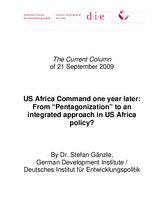US Africa Command one year later: from “Pentagonization” to an integrated approach in US Africa policy?
Gänzle, StefanThe Current Column (2009)
Bonn: German Development Institute / Deutsches Institut für Entwicklungspolitik (DIE) (The current column of 21 September 2009)
Bonn, 21 September 2009. Just about one year ago, on 1 October 2008, a new US regional military command was officially activated and took up its operations. One of its main objectives is to “more closely collate” civil and military aspects of US Africa policy. While some observers have, with this in mind, termed the Africa Command (AFRICOM) a welcome new experiment for the post-Cold War era, it has met with vehement criticism on the part of many African nations, culminating in, among other things, the accusation that the new Command amounts to little more than a creeping militarisation of US Africa policy. AFRICOM early found itself faced with a number of problems that clearly illustrate the special challenges generally involved in cooperation between actors at the interface between development and security.
The original intention of the then Bush administration in establishing AFRICOM was to adapt the organisation of its regional military commands to a new overall political climate that had emerged post 1989, but also in connection with the events of 2001. If the project had simply been declared a technical-administrative act, it would presumably not even have gained undue public attention. In view of the fact that three unified regional commands had until then shared responsibility for Africa, a reform measure of this kind would have been wholly plausible. The idea of a concentrated focus on the African continent, which had, since 2001, begun to play a growingly important role for the US’ global anti-terror efforts, was to accord due consideration to Africa’s increasing significance for US economic and security policy. Above all, though, the move set the stage for the US Department of Defense to assign itself a broader role in the shaping of US policy. With an eye to justifying this new engagement, AFRICOM’s mandate was, at first, virtually deluged with ambitious development-related goals. Indeed, to some it even seemed that AFRICOM was to be assigned, on a permanent basis, central responsibility for coordinating US Africa policy. At the same time, though, these goals, which went far beyond purely military responsibilities, placed AFRICOM under a huge weight of expectations that it itself had generated.
The emphasis placed on AFRICOM’s civil component – the Command has a civilian deputy with a rank equivalent to commander – alongside its partnership-oriented and interagency approach, may be seen as indicating that some forward-looking elements have in fact been included in the planning for the new Command. One aspect that remains problematic, however, is that these two spheres of responsibility have continued to be dogged by substantial structural deficits: First, AFRICOM’s staff – and this goes in particular for the staff members to be recruited from USAID and the State Department – has not yet reached its target levels, and the Command has come nowhere near reaching its stated aim of recruiting roughly one quarter of its permanent staff primarily from the State Department and USAID. Second, the partnership-based approach announced by the Command’s has thus far failed to engage with regional organisations and NGOs active in the field of development in Africa, and it was only after the fact that AFRICOM saw fit to inform African governments and organisations about its tasks and objectives. In other words, the fact that no African nation – except Liberia, which has traditionally entertained close ties with the US – has declared its willingness to host AFRICOM headquarters cannot be explained away merely as an anti-American reflex on the part of many Africans. Even US NGOs and their federations (e.g. Global Impact or Inter Action), who fear possible negative repercussions from any overly close association with the Command, have openly expressed reservations on AFRICOM.
Since Robert Gates was appointed as US Secretary of Defense, replacing Donald Rumsfeld – before going on to join the new Obama administration – AFRICOM has responded to this development by further focusing its mandate and placing greater emphasis on the military components – and in particular on the joint training component. There is a marked need for more intensive discussion in and around AFRICOM on fundamental issues bound up with the projected close cooperation between foreign, defence, and development policy, for instance in the field of security-sector reform. In view of the foreign-policy challenges with which the US continues to be faced in Iraq and Afghanistan, though, there is little reason to expect any fundamental decisions to be taken in the immediate future.
Despite these initial difficulties, AFRICOM could still generally benefit from closer interagency cooperation – provided, that is, that the agencies concerned are themselves prepared to enhance interagency coordination. A rediscovery of the National Security Council under the Obama administration and the ongoing discussion on the need for the US to take measures to strengthen and upgrade the institutional framework of its development cooperation must be seen as first steps in the right direction. In any event, though, it can only be correct to continue to reduce the special role that the Pentagon played in US foreign policy in the G.W. Bush years and to restore the primacy of foreign policy, precisely when it comes to integrated policy approaches.
